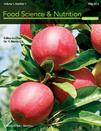
Food Science & Nutrition
Scope & Guideline
Exploring the vital links between food and wellness.
Introduction
Aims and Scopes
- Nutritional Biochemistry:
Research that investigates the biochemical mechanisms through which nutrients affect health, including studies on vitamins, minerals, and phytochemicals. - Food Safety and Quality:
Studies focusing on the microbial, chemical, and physical safety of food products, including risk assessment and the impact of processing techniques. - Functional Foods and Nutraceuticals:
Research on foods that provide health benefits beyond basic nutrition, including the development and evaluation of functional ingredients and their effects on health. - Dietary Patterns and Public Health:
Investigations into how dietary habits influence public health outcomes, including obesity, diabetes, and cardiovascular diseases. - Innovative Food Processing Techniques:
Research on novel technologies and methods aimed at enhancing the nutritional quality, safety, and sensory attributes of food products. - Food Chemistry and Technology:
Explorations of the chemical properties of food components and their interactions during processing and storage. - Microbiome and Gut Health:
Studies examining the relationship between diet, gut microbiota, and health, including the effects of probiotics and prebiotics.
Trending and Emerging
- Plant-Based Diets and Alternatives:
There is a notable increase in research focused on plant-based diets, including studies on the health benefits of plant-based proteins and alternatives to meat. - Sustainable Food Practices:
Emerging themes around sustainability in food production and consumption, including the environmental impacts of dietary choices and food waste management. - Microbiome Research:
A growing body of work is dedicated to understanding the gut microbiome's role in health and disease, particularly how dietary interventions can modulate microbiota. - Food Innovation and Technology:
Research into innovative food processing technologies, such as nanoencapsulation and bioprocessing, is gaining traction as methods for enhancing food quality and safety. - Nutritional Genomics:
Studies exploring the interaction between genetics and nutrition are emerging, focusing on personalized nutrition and its implications for health. - Functional Ingredients and Bioactive Compounds:
There is an increasing emphasis on research that identifies and characterizes bioactive compounds in foods and their potential health benefits.
Declining or Waning
- Traditional Food Preservation Methods:
Research on conventional food preservation techniques, such as canning and drying, has declined as modern methods and technologies gain prominence. - Generalized Dietary Supplements:
There appears to be a waning interest in studies focusing solely on generic dietary supplements without specific functional claims or health outcomes. - Single Nutrient Studies:
Research focusing exclusively on the effects of individual nutrients is decreasing, as there is a growing recognition of the importance of whole foods and dietary patterns. - Animal-Based Diets:
Studies centered around the benefits of high animal-product diets are diminishing, reflecting a growing shift towards plant-based diets and their health implications.
Similar Journals
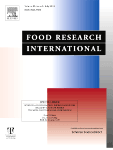
FOOD RESEARCH INTERNATIONAL
Uncovering Insights for a Sustainable Food FutureFOOD RESEARCH INTERNATIONAL is a premier academic journal published by ELSEVIER, specializing in the field of Food Science. With an impressive impact factor and ranked Q1 in the 2023 category quartiles, it stands at the forefront of research, positioned 17th out of 389 in the Scopus ranking for Agricultural and Biological Sciences, attaining a commendable 95th percentile. The journal publishes high-quality, peer-reviewed articles that cover a broad spectrum of topics, including food safety, quality control, nutrition, and biotechnology, making it an invaluable resource for academics, industry professionals, and students alike. As FOOD RESEARCH INTERNATIONAL seeks to enhance understanding and advance technologies related to food, it encourages innovative perspectives and interdisciplinary research. The journal, active from 1992 and continuing through 2024, is an essential platform for disseminating vital findings and fostering collaboration within the global food science community.

Food Science and Human Wellness
Transforming Knowledge into Nutritional SolutionsFood Science and Human Wellness, published by TSINGHUA UNIVERSITY PRESS, is an esteemed open-access journal that has been at the forefront of advancing research in the interdisciplinary fields of food science and human health since its inception in 2012. With an impressive impact factor indicative of its quality and relevance, this journal holds a prestigious Q1 ranking in Food Science according to 2023 metrics, reflecting its commitment to high-caliber research and innovation. The journal is positioned within the top 12% of its category, ranked 46th out of 389 in Agricultural and Biological Sciences. The journal not only publishes original research articles but also critical reviews, perspectives, and innovations that contribute significantly to our understanding of the relationship between nutrition, wellness, and food science. With its Open Access model, Food Science and Human Wellness ensures that its valuable content is available to a global audience, fostering collaborative advancements in this vital field. Researchers, professionals, and students are invited to explore insightful discussions and impactful studies that aim to enhance public health and food safety.
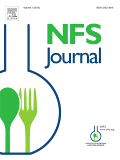
NFS Journal
Elevating standards in dietetics and food science research.NFS Journal, published by ELSEVIER, is at the forefront of research in the fields of Food Science and Nutrition and Dietetics, boasting an impressive impact factor that underscores its significance. With an Open Access model since 2015, the journal facilitates widespread dissemination and accessibility of high-quality research, making it a valuable resource for scholars and practitioners alike. Located in Germany, this journal has made its mark with its prestigious Q1 ranking in both Food Science and Nutrition and Dietetics as of 2023, positioning it among the top-tier journals in these disciplines. Additionally, it holds an outstanding standing in Scopus rankings, being placed at 10th out of 140 in Nutrition and Dietetics and at 27th out of 389 in Food Science, reflecting its influence and reach within the global academic community. The NFS Journal is dedicated to publishing the latest advancements and practices that shape our understanding of the relationship between food, health, and nutrition, appealing to researchers, professionals, and students eager to stay updated with novel insights and breakthroughs.
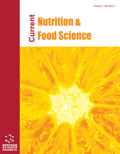
Current Nutrition & Food Science
Unveiling cutting-edge research in nutrition and dietetics.Current Nutrition & Food Science is a prominent journal in the fields of Food Science, Nutrition, and Dietetics, published by Bentham Science Publishers Ltd. Based in the United Arab Emirates, the journal has been a significant resource since its inception in 2006, and is expected to continue contributing valuable insights through 2024. With an impressive impact factor and a comprehensive scope that examines the intersection of nutrition, food science, and public health, it operates within Category Quartiles reflecting its standing, with rankings in Q3 for Food Science and Nutrition, and Q4 for Public Health. Despite its challenges in visibility as indicated by current Scopus rankings, the journal remains a critical platform for ongoing research and discussions in the realm of nutritional science. Researchers, professionals, and students alike will find that the journal's commitment to quality and relevance makes it an essential tool for advancing understanding and innovation in nutrition and food science.
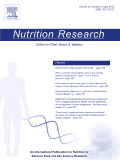
NUTRITION RESEARCH
Leading the Charge in Nutritional Science and HealthNUTRITION RESEARCH, published by PERGAMON-ELSEVIER SCIENCE LTD, stands as a pivotal platform for the dissemination of groundbreaking research in the fields of nutrition, dietetics, and endocrinology. With an established track record since 1981, the journal has successfully converged its academic purview into 2024, providing a continuous source of high-impact studies that address critical issues in human health and nutrition. Recognized as a Q2 journal in multiple relevant categories, including Endocrinology and Nutrition, as well as boasting respectable Scopus rankings, it serves a diverse audience of researchers, professionals, and students eager to enhance their understanding of nutritional science. Although the journal does not operate on an open access model, its contributions are invaluable, fostering advancements and collaboration within the scientific community dedicated to improving dietary practices and outcomes. The current address of the journal is THE BOULEVARD, LANGFORD LANE, KIDLINGTON, OXFORD OX5 1GB, ENGLAND, positioning it at the heart of global research initiatives.
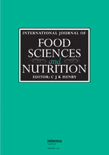
INTERNATIONAL JOURNAL OF FOOD SCIENCES AND NUTRITION
Exploring the forefront of food quality and safety.International Journal of Food Sciences and Nutrition, published by Taylor & Francis Ltd, is a premier, peer-reviewed journal that has established itself as a leading platform for the dissemination of cutting-edge research in the field of food science and nutrition. With an impressive Q1 categorization and an academic rank of #59/389 in Scopus’s Agricultural and Biological Sciences category, this journal is recognized for its significant impact, facilitating critical discussions and advancements related to food quality, safety, and nutritional health. Its historical significance, covering research from as early as 1947 to the present day, underscores the journal's long-standing commitment to scientific rigor and innovation. Researchers and professionals benefit from this journal's comprehensive and diverse range of studies, contributing to informed practices and developments in the food industry and public health. Although the journal is not open access, it provides various access options, ensuring that high-quality research is available to academics and practitioners alike. Stay connected with current trends and breakthroughs in food sciences and nutrition through this highly respected publication.

Food Production Processing and Nutrition
Empowering scholars with breakthrough findings in food science.Food Production Processing and Nutrition, published by SpringerNature, stands at the forefront of advancing knowledge in the vibrant fields of food science, nutrition, and public health. This esteemed Open Access journal, operational since 2019, plays a pivotal role in disseminating breakthrough research that intersects food production processes with nutritional insights, making it an invaluable resource for researchers, professionals, and students alike. With a commendable 2023 impact factor reflecting its robust scholarly contributions — Q1 in Food Science and Q2 in both Nutrition and Dietetics and Public Health, Environmental and Occupational Health — the journal not only emphasizes the importance of innovative food processing methods but also addresses pressing nutritional challenges faced globally. Located in the United Kingdom, it claims an impressive Scopus ranking, with a notable percentile standing across various categorical metrics. As such, Food Production Processing and Nutrition is essential for anyone aiming to deepen their understanding of how food systems impact public health through effective processing and nutritional strategies.
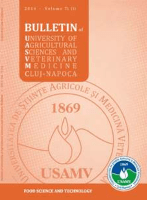
Bulletin of University of Agricultural Sciences and Veterinary Medicine Cluj-Napoca-Food Science and Technology
Innovative Insights for the Future of Food SafetyBulletin of University of Agricultural Sciences and Veterinary Medicine Cluj-Napoca - Food Science and Technology is a prominent peer-reviewed journal dedicated to advancing the field of food science and technology. Published by the University of Agricultural Sciences and Veterinary Medicine Cluj-Napoca, this open-access journal has been serving the academic community since 2013, promoting the dissemination of high-quality research that addresses pressing issues in food safety, quality, and innovation. With its ISSN 2344-2344 and E-ISSN 2344-5300, the journal aims to bridge the gap between academia and industry by providing a platform for scholars and practitioners to share their findings, insights, and methodologies. Situated in the heart of Romania, the journal reflects the country's rich agricultural heritage and its commitment to enhancing global food systems. By maintaining a rigorous editorial standard, the Bulletin ensures that it remains a vital resource for researchers, industry professionals, and students who are keen to explore the latest developments in food science.

Nutrients
Fostering collaboration for impactful nutritional research.Nutrients is a premier, peer-reviewed open access journal published by MDPI, dedicated to advancing the field of nutrition and dietary research. Since its inception in 2009, this journal has consistently garnered acclaim, achieving a Q1 ranking in both Food Science and Nutrition and Dietetics, reflecting its significant impact in these vital areas of study. With a robust Scopus ranking of #40 out of 389 in Food Science and #18 out of 140 in Nutrition and Dietetics, Nutrients has established itself as a leading platform for researchers, practitioners, and students aiming to share and gain insights into nutritional epidemiology, dietary interventions, and policy implications. Hailing from Basel, Switzerland, the journal ensures broader accessibility through its open access model, inviting diverse contributions that enhance our understanding of nutrition in health and disease. By fostering collaboration across disciplines, Nutrients not only serves as a resource for high-quality research but also encourages innovation essential for tackling global nutritional challenges.

eFood
Transforming food systems with open-access knowledge.eFood is a pioneering journal in the field of food science, published by the esteemed WILEY. With its impactful emergence, the journal has rapidly established itself within the academic community, evidenced by its impressive Q1 category ranking in Food Science as of 2023, and a commendable position at Rank #95 out of 389 in the Scopus database. Covering a wide spectrum of topics related to food innovation, technology, safety, and nutrition, eFood serves as an indispensable platform for researchers, industry professionals, and students who are at the forefront of advancing our understanding of food systems. The journal notably operates with an open-access model, promoting wide dissemination of knowledge while enhancing the visibility of high-quality research. As we look forward to converging years from 2020 to 2024, eFood is poised to foster rigorous scientific discourse and contribute significantly to the future of food science research.